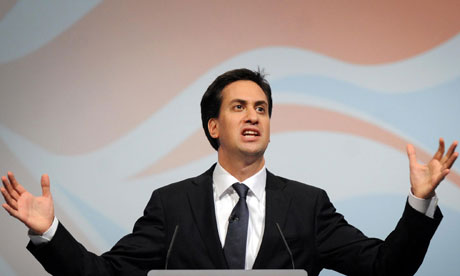Ed Miliband has been urged by a former senior Labour adviser to embark on "a far bigger and blunter conversation" about future spending and tax choices facing the UK.
Gavin Kelly, deputy chief of staff in Downing Street between 2007 and 2010, said Labour could not evade difficult choices on the deficit just by asserting in general that state spending will have to be constrained for at least a decade.
Former Labour cabinet minister Alan Johnson has also warned that Miliband must do more to get his message across and to recover from a shaky start to 2012. The former cabinet minister told the Mirror he believed the Labour leader had "the personality, the intellect and the steely determination to succeed" but unless he got out "on the stump" to gain public recognition and made the opposition sound more relevant to ordinary voters, Labour would be in trouble.
Miliband is expected to use a major speech on Tuesday to argue that social democracy has to be rethought for a period of long-term austerity.
Kelly, a former adviser to Gordon Brown and Tony Blair and now chief executive at the Resolution Foundation thinktank, wrote on his New Statesman blog on Sunday night that in such debates on the future of the left "there will be no prizes for sounding more hawkish in the abstract and dovish whenever it comes to specifics".
He warned that the new agenda would require "a scary transition" in which a whole generation of Labour politicians unlearned how they used to conduct politics – using steadily rising spending to win over competing groups of the electorate.
Kelly wrote: "Today's Labour leadership perhaps unsurprisingly has been caught between the realisation that this model of politics is over and an instinctive reluctance to embark on the new and far harder course – one which accepts, sooner or later, the need for clarity about who will be the winners and losers from Labour's fiscal decisions, and the need to build widespread public consent for these choices.
"Outraged representatives of the groups who feel let down will appear on our TV screens. It's tough to handle this in government, harder still when in opposition with few friends. But unless and until Labour makes this mental shift it will continue to be stuck in a largely defensive posture; defined more by its opponents than by its own positive choices. That is a position it must break out of long before the curtain falls on 2012."
Miliband has already had to defend himself against claims made by the Labour peer Lord Glasman that he had no strategy, no narrative and little sign of energy. But Kelly stressed he was not indulging in criticism of Miliband, but contributing to the debate on how Labour strategy evolves after the coalition's admission that austerity will continue until after the next election.
Kelly wrote: "The risk now is that the Labour leadership moves from talking about the short-term case for stimulus to talking about longer-term deficit reduction without yet having a strategic account of what this would mean for the state: what it should do less of, more of, and differently, given the realities of the next decade and beyond."
Kelly said the UK faced "the towering fiscal cost of an ageing society" and "any party that wants to win in 2015 with a claim to the future will have no choice other than to speak directly to challenges like these".
"All of which reinforces the view that a far bigger and blunter conversation about future choices is needed than the one that Labour has so far embarked upon with the public. What does a plausible Labour cuts agenda look like for 2015; what are real priorities for the future where Labour should seek to increase investment; and what does a Labour tax agenda for 2015-2020 look like?
He proposes Labour offers less generous support for affluent baby boomers in terms of universal benefits; puts in place a proper Dilnot-esque system of social care overwhelmingly paid for by the ageing generation itself rather than their working age counterparts; and more help for childcare and less support for the affluent in building up pensions. Labour should also back capital investment in areas such as housing, even if it means "a longer era of low or no growth in current expenditure".
He warned: "If Labour can't muster the resolve to consider these shifts – or alternative ones conjured by wiser minds – then it isn't going to persuade a sceptical public that it is distinctive or has what it takes to govern in the tough decade ahead. The alternative is a slide towards a soggy, cautious politics in which the leadership feels boxed in by a left that cries 'betrayal' in response to any proposed cut, and a right that screams 'deficit denial' at any new consideration of collective action."
Kelly also said the party could not ignore new ways of raising tax, adding he finds it a mystery why Labour has opted to cede the rhetorical argument about taxing wealth and property to the Lib Dems. "Any new property tax will of course be fiendishly complex to design in a way that raises serious money without being politically toxic," he noted.










